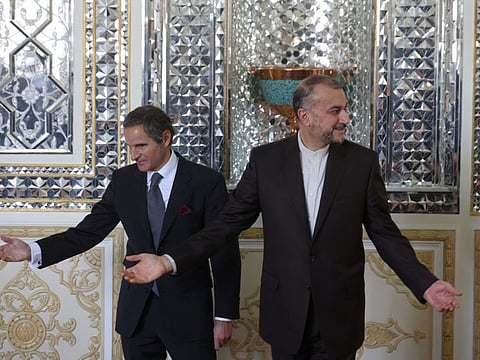Good and durable nuclear deal is within reach, Iran’s foreign minister says
‘No single party can determine end result, a joint endeavour is needed’

Tehran/Miami: Iran’s foreign minister said on Friday a nuclear deal is within reach, “if US acts realistically and consistently”.
Iran and the United States were at loggerheads over reviving the 2015 nuclear deal on Thursday after Tehran suggested there were new obstacles and Washington said hard issues remained.
“Efforts to reach a good and durable agreement continue; it is within reach if US acts realistically and consistently,” Hossein Amirabdollahian said on Twitter.
“No single party can determine end result, a joint endeavour is needed,” he said.
The minister said on Thursday there were still two to three difficult questions to resolve and that Tehran was now also demanding a change in the sequencing of how an accord should be implemented.
Amirabdollahian appeared to suggest one of the stumbling blocks remained the extent to which sanctions on Iran’s elite revolutionary guards would be rolled back.
“Some topics related to our national heroes are not negotiable,” he was quoted saying after a call with the European Union’s foreign policy chief Josep Borrell.
Iran has also said it wants guarantees that no future US president will again abandon a nuclear deal.
A week ago preparations were being made in Vienna for a weekend meeting to conclude an agreement bringing Iran back into compliance with the deal’s restrictions on its rapidly advancing nuclear activities and bringing the United States back into the accord it left in 2018 by re-imposing sanctions on Tehran.
Russian demands
Then last Saturday Russian Foreign Minister Sergei Lavrov unexpectedly demanded sweeping guarantees that Russian trade with Iran would not be affected by sanctions imposed on Moscow over its attacks of Ukraine - a demand Western powers say is unacceptable and Washington has insisted it will not entertain.
Russia’s demand initially angered Tehran and appeared to help it and Washington move towards agreement on the few remaining thorny issues, diplomats said, but a sudden volley of public comments by Iranian officials including Supreme Leader Ali Khamenei on Thursday suggested the wind had turned.
“US approach to Iran’s principled demands, coupled with its unreasonable offers and unjustified pressure to hastily reach an agreement, show that US isn’t interested in a strong deal that would satisfy both parties,” Khamenei’s top security official Ali Shamkhani said in English on Twitter on Thursday morning.
“Absent US political decision, the talks get knottier by the hour,” said Shamkhani, secretary of Iran’s Supreme National Security Council.
Shamkhani did not specify what the demands were but that there were any at all contradicted what four Western officials had said - that a final draft text had been agreed which only needed minor adjustments with the exception of the open question about Russia’s sweeping demand for guarantees.
The text does, however, include a similar but much narrower guarantee covering nuclear cooperation between Russia and Iran outlined in the agreement, diplomats said.
The United States on Thursday reiterated that it had no intention of accommodating Russia’s last-minute demands, which it has said have nothing to do with the Iran talks and added that a small number of outstanding and difficult issues were still yet to be resolved for a deal to be reached.
“We also have no intention of offering Russia anything new or specific as it relates to sanctions nor is anything new required to successfully reach an agreement on a mutual return to full compliance with the JCPOA,” State Department spokesperson Ned Price said.
“We remain close to a possible deal. It’s really down to a very small number of outstanding issues. But the reason these particular issues are outstanding is because they are among the most difficult ones,” Price said.
US seizes Iran oil cargo as Biden considers easing sanctions
Meanwhile, the US has quietly seized the cargo of two tankers suspected of transporting Iranian oil as part of an elaborate sanctions-busting scheme involving forged documents and the repainting of a ship’s deck to cloak illegal shipments.
Details of the seizure, which has not been previously reported, were contained in a federal civil case unsealed last month after the Greek-managed vessels discharged their valuable cargo, worth upward of $38 million, in Houston and the Bahamas at the direction of US law enforcement.
“This seizure serves as a perfect example of why the US should not lift sanctions,’’ said Claire Jungman, the chief of staff at the New York-based group United Against Nuclear Iran, which closely tracks Iran’s crude shipments.
“We should continue to work to ensure that the IRGC cannot use profits from its sale of Iranian oil to fund terrorism and other activities that threaten the safety and security of all Americans.’’
Sign up for the Daily Briefing
Get the latest news and updates straight to your inbox



